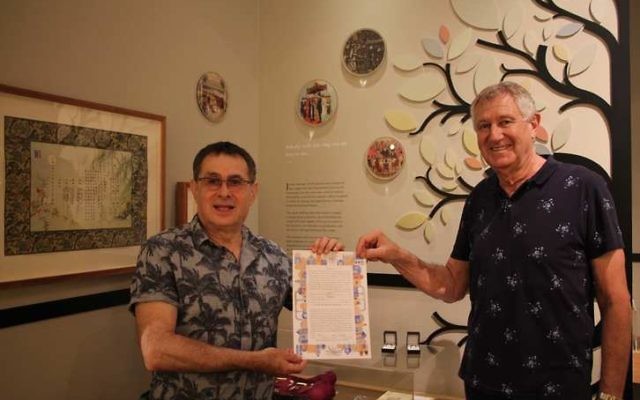‘Inspiration to follow the kind of life that we have’
Nearly one year after Ilan Buchman and Oscar Shub married in Australia’s first official religious same-sex wedding, they spoke with Sophie Deutsch about the significance of tying the knot after 47 years together, and the inspiring example their enduring love has set for others.

INSIDE the archives of the Sydney Jewish Museum, head curator Roslyn Sugarman methodically sorts through various items to locate a white shoe-sized box.
Lifting out two smaller boxes, she opens each one to reveal two broken black rings engraved with the poignant words ‘until we all belong’.
During the campaign for same-sex marriage in Australia, now married couple Ilan Buchman and Oscar Shub wore these black metal bands as a symbol of their commitment and love – and importantly, to send a powerful message about the gap in equality.
“It was started by [brands including] Airbnb, ANZ and Qantas and it was a fantastic concept to say to people, ‘we can’t have a round ring because we are not equal’,” remarked Oscar.
On their wedding day last May, the couple exchanged their broken rings for two complete ones.
Until their visit to the museum earlier this month, neither had seen the broken bands since their wedding.
“They are now a thing of the past,” remarked Oscar. “It’s nice to see that you don’t have to have a broken ring anymore, it was part of the journey.”
These rings, the couple’s ketubah and a selection of meaningful photos tracing the development of Ilan and Oscar’s relationship are currently stored in the museum’s archives – to be exhibited in a future display as a visual representation of Australia’s progress in reforming the institution of marriage.
Without a moment’s hesitation, Oscar definitively cited “being equal” as the most significant difference between their lives before the wedding and now.
“Yes, equal,” concurred Ilan.
“Being equal to everybody else,” Oscar repeated, before Ilan chimed in: “Well, the other difference is that now, if you have an argument, you can always threaten divorce!”
Jokes aside, the positive ramifications of marriage equality on Australia’s social fabric comes up time and time again.
“I do think there has been a change in the atmosphere in Australia since the marriage equality legislation,” said Oscar.
With both men having witnessed this shift first-hand, Ilan remarked: “We have some friends who have said they had difficulties [being accepted] by their parents, but once it was normalised by the state, they felt that it was quite okay.”
When Ilan and Oscar stood under the chuppah at Emanuel Synagogue, they agreed to publicity because “it was important for us to send a message of acceptance to others that you can be part of a community that welcomes you”, Ilan told The AJN at the time.
It seems many couples have been moved by the long-lasting and strong emotional bond exemplified in Ilan and Oscar’s relationship. “We just spent a weekend with some friends in the Southern Highlands, and they were talking about their relationship to us … Their comment was that it’s such an important relationship because we have given them the inspiration to follow the kind of life that we have,” shared Oscar. “It was a beautiful comment.”
Ilan and Oscar’s love story began in 1971 when they met in Tel Aviv. Over the years, the couple have shared a great love of culture, movies, theatre, opera, reading, and pursued values of justice and righteousness with heartfelt compassion, Rabbi Jeffrey Kamins, who officiated their wedding, remarked on the day.
Since then, Ilan and Oscar have become congregants of the shule. “When we go there, we feel in no way different to anybody else and we are a part of that community,” said Ilan. “If we are going to an Orthodox event, we would feel like [we are] conditionally accepted… because first of all, you don’t have a wife, you don’t have children, you are a same-sex [couple].”
Regarding the Orthodox stance on same-sex marriage, Ilan commented: “They can’t change the existing laws, so in that sense I accept it … But when you have people who start comparing homosexuals to deviates or pedophiles that is totally unacceptable … Many rabbis wouldn’t marry gay people, and clearly one understands their position, but you don’t hear them saying anything abusive or negative.”
Oscar added, “There were rabbis who said, ‘I cannot support same-sex marriage, but it is a human rights question, so you should feel free to vote as you believe.’ I thought that was incredible progress for the Orthodoxy.”
But marriage equality is far from a panacea, and both commented that organisational homophobia is still cause for concern.
“There is personal acceptance but I don’t think that it transcends to real true acceptance,” commented Ilan, while Oscar compared this phenomenon to a glass ceiling for women.
“It’s a good example,” said Ilan. “Everyone is nice and accepting of women, but there is a block in terms of their progress and reaching top positions, and I think that in Jewish organisations and organisations across the country, there is a similar kind of glass ceiling for gay people.”
SOPHIE DEUTSCH


comments